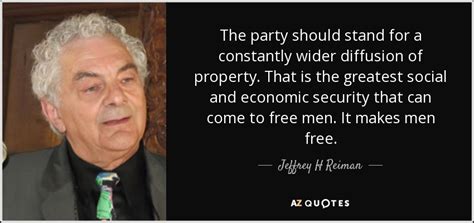A Quote by Daniel Webster
A representative form of government rests nor more on political contributions than on those laws which regulate the descent and transmission of property.
Related Quotes
There is something that governments care for more than human life, and that is the security of property, and so it is through property that we shall strike the enemy.... Those of you who can break windows--break them. Those of you who can still further attack the secret idol of property, so as to make the Government realize that property is as greatly endangered by women's suffrage as it was by the Chartists of old--do so. And my last word is to the Government: I incite this meeting to rebellion!
In the nature of things, those who have no property and see their neighbors possess much more than they think them to need, cannot be favorable to laws made for the protection of property. When this class becomes numerous, it becomes clamorous. It looks on property as its prey and plunder, and is naturally ready, at times, for violence and revolution.
Any property may now be taken for the benefit of another private party, but the fallout from this decision will not be random. The beneficiaries are likely to be those citizens with disproportionate influence and power in the political process, including large corporations and development firms. As for the victims, the government now has license to transfer property from those with fewer resources to those with more. The Founders cannot have intended this perverse result.
A criminal is a person with predatory instincts who has not sufficient capital to form a corporation.Most government is by the rich for the rich. Government comprises a large part of the organized injustice in any society, ancient or modern.Civil government, insofar as it is instituted for the security of property, is in reality instituted for the defence of the rich against the poor, and for the defence of those who have property against those who have none.
In civilized communities, property as well as personal rights is an essential object of the laws, which encourage industry by securing the enjoyment of its fruits; that industry from which property results, and that enjoyment which consists not merely in its immediate use, but in its posthumous destination to objects of choice, and of kindred affection. In a just and free government, therefore, the rights both of property and of persons ought to be effectually guarded.
The United Nations and the Organization of American States have named 2011 as the International Year for People of African Descent. This is an opportunity for all of us around the globe to celebrate the diversity of our societies and to honor the contributions that our fellow citizens of African descent make every day to the economic, social and political fabrics of our communities.
The widespread distribution of private property ownership is the cornerstone of American liberty. Without it neither our free enterprise system nor our republican form of government could long endure.... The next Republican Administration will...not only protect the cherished human right of property ownership, but will also work to help millions of Americans - particularly those from disadvantaged groups - to share in the ownership of the wealth of their nation.
If Aristotle, Livy, and Harrington knew what a republic was, the British constitution is much more like a republic than an empire. They define a republic to be a government of laws, and not of men. If this definition is just, the British constitution is nothing more or less than a republic, in which the king is first magistrate. This office being hereditary, and being possessed of such ample and splendid prerogatives, is no objection to the government's being a republic, as long as it is bound by fixed laws, which the people have a voice in making, and a right to defend.








































